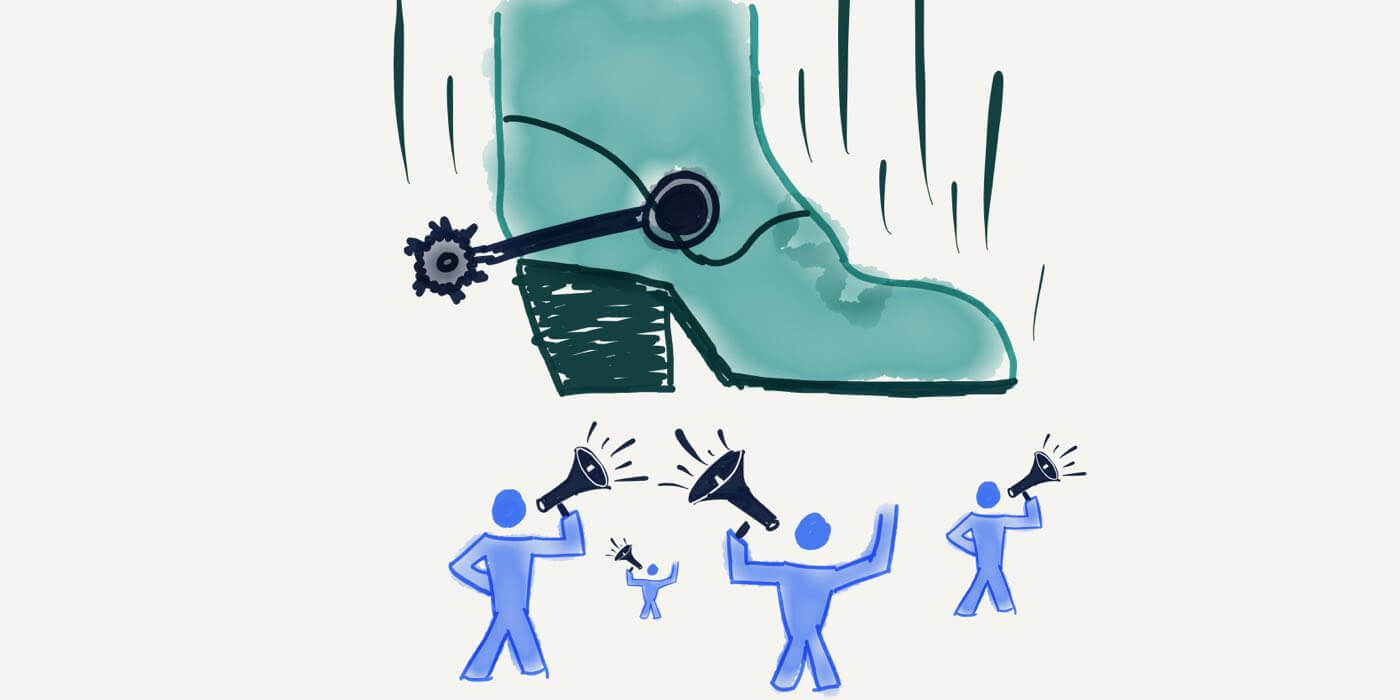Most people use one of two strategies to cope with painful emotions:
- Fix it. The minute you start feeling anxious, for example, your negative and judgmental self-talk kicks in and you start arguing with yourself about why you shouldn’t feel anxious. And how if you were a little tougher you wouldn’t be stressed out all the time. As if berating yourself for feeling bad would help you feel better…
- Run away. Of course, it’s natural to want to avoid things that hurt. The trouble is, no matter how fast you run, you will never outrun or escape your own mind, including your difficult emotions. You might succeed in distracting yourself from them temporarily, or numbing them for a time, but you can’t escape yourself.
Obviously, neither of these strategies for dealing with difficult moods and emotions works real well. And in fact, they tend to increase your emotional suffering in the long-term for a very simple reason:
If you always treat painful emotions like a problem, eventually your brain starts to believe that they are.
Once you’ve taught your brain to view painful emotions as dangerous—because you’re always treating them like problems to be fixed or dangers to be escaped from—you’ve entered the realm of true emotional suffering. Now you start feeling bad about feeling bad, which is the source of chronic emotional pain.
Luckily, there’s a relatively simple way out of this mess…
You can start listening to your emotions instead of avoiding them.
This has two big benefits:
- You might learn something. Despite how it feels, painful emotions like anxiety and grief are not viruses out to get you. They’re a perfectly normal and adaptive part of human nature. Like lights on your car’s dashboard, they’re often trying to tell you something important.
- You will train your brain to stop being afraid of feeling bad. Once you get in the habit of listening to your painful emotions instead of trying to problem-solve them or run away from them, your brain stops believing that they’re dangerous. As a result, that second layer of painful feeling—feeling bad about feeling bad—starts to go away.
In the rest of this article, I’ll walk you through three painful emotions that most people try very hard to avoid or eliminate. But I’ll show you how you might approach and listen to them instead. And how doing so might lead to some surprising insights (and relief) along the way.
1. Jealousy
Whenever people talk to me about feeling jealous, “gross” is the adjective they most often use to describe it:
- Ugh… I hate that I get jealous of her so much. It’s just gross!
- Jealousy is such a gross feeling… I really wish I could just be happy for people who are more successful than I am instead of always feeling jealous.
The problem here is that people are conflating feeling jealous with acting jealous.
For most people, acting out their jealousy is a morally questionable thing. For example:
- Acting on your jealousy by spreading untrue rumors about a coworker behind their back.
- Feeling jealous of your best friend’s partner and then cheating on your spouse with them by having an affair.
Acting out your jealousy can certainly be harmful and—I think most would agree—morally reprehensible.
But feeling jealous isn’t a moral phenomenon since it’s not something you can control. No one’s ever been sent to prison for feeling jealous—that’s not how our legal and ethical systems work. Only your actions can be deemed good or bad, right or wrong.
And while we understand this distinction in others—you probably wouldn’t be judgmental of a friend who admitted to you that they were feeling jealous of a coworker—oddly, we throw it out the window with ourselves. That is, we judge ourselves as morally wrong for even feeling jealous!
I’d like to present an alternative theory of jealousy based on the assumption that it’s completely normal to occasionally feel jealous of other people:
Feeling jealous is often a signal from your mind that you lack something important.
Here are a couple examples:
- When you feel jealous of a coworker who frequently gets more praise and acknowledgment from your boss than you do, maybe that uncomfortable feeling of jealousy is your mind’s way of saying: “I wish I had more recognition in my life for the work I do.”
- When you feel jealous of a friend and their romantic partner, maybe that’s your mind’s way of telling you something: “I want a more intimate and exciting romantic relationship in my life.”
In other words, jealousy is usually a perfectly normal signal from your mind that you lack something valuable in your life.
So rather than immediately assuming you’re a terrible person simply for feeling jealous, try asking yourself this question:
What is my jealousy trying to tell me right now?
If you regularly feel jealous of other people and their accomplishments or possessions, it might be helpful to do a little introspection about what you really want out of life and why you’re not getting it.
Values clarification can be a really helpful process for doing this.
2. Irritability
I feel bad for the emotion of irritability because people are always unfairly blaming it on things:
- I always get irritable when I’m hormonal.
- You’d be irritable all the time too if you had to work with these idiots.
- Maybe you’d be less irritable if you actually took your medication like the doctor said.
All of these assume that irritability is a bad thing. Or a side effect of some bad thing in your life.
But here’s the thing:
The fact that irritability feels bad has nothing to do with whether it is bad.
Being sore after a workout feels bad. But it is, in fact, a very good thing—it means your muscles are growing and you’re getting stronger. Similarly, even though irritability feels bad, it’s usually the case that it’s a good thing because it’s telling us something important.
Here are a couple examples:
- If you feel chronically irritated at your employees for not working hard enough or in the way you think they should, maybe that’s your mind’s way of telling you that you need to be more clear in your expectations of their work.
- If you feel chronically irritable with your spouse whenever he brings up the topic of his parents, maybe that means you need to have a discussion about boundaries.
In other words…
Irritability is often a sign that you need to be more assertive in your communication.
We often feel irritated and frustrated when we think things or people ought to be one way and they end up being another. Sometimes this is the result of unrealistic expectations. In which case, the work is to identify those expectations and work on modifying them.
But more often than you realize, things could go a lot more smoothly with other people and your relationships if you were willing to speak your mind clearly and confidently—that is, if you were willing to be more assertive.
Of course, assertiveness is difficult because a lot of us are afraid of conflict. Rather than risk “making a scene” or offending someone, we keep our mouths shut, “go with the flow,” and end up chronically irritable and resentful
But assertive communication is a skill. Which means it’s something you can get much better at with practice.
If you’re chronically irritable, it might be your mind’s way of encouraging you to practice being a little more assertive.
3. Loneliness
As a psychologist, I talk to a lot of lonely people. And here’s what I think most people—even the ones who feel lonely—misunderstand about it:
Loneliness is a desire for intimacy, not connection.
I mean, think about it: we’re all plenty connected these days: between social media, Zoom meetings, and all those emails from LinkedIn asking to ”connect,” I just don’t think a lack of connection is really what we’re missing.
Put another way, loneliness is not a quantity thing, it’s a quality thing.
Most people who feel lonely end up feeling bad about it because they see all these connections they have and wonder what’s wrong with them for feeling lonely when they’re so obviously connected.
The way I see it, what chronically lonely people really lack is meaningful connections. And the biggest factor in whether a connection or relationship is meaningful is the level of emotional intimacy that’s present.
Emotional intimacy means that you can share how you feel with other people and feel understood by them.
Of course, for many people, achieving even a little bit of emotional intimacy is hard. And it’s hard for one main reason:
To experience emotional intimacy you have to practice emotional vulnerability.
You can’t expect to feel a shared sense of belonging and intimacy with another person if you’re not willing to open yourself up and share your own feelings with them.
So rather than viewing your feelings of loneliness as a character defect or one more symptom of your depression, try listening to it as a helpful message.
What if you reframed loneliness as your mind’s way of reminding you that deep, emotional intimacy is something we all crave? And no matter how difficult it may be, we all need to practice emotional vulnerability if we’re going to find the emotional intimacy we really crave.
All You Need to Know
Instead of trying to “fix” your difficult feelings or run away from them, it’s usually more helpful (and less stressful) to listen to them instead.
Not only can you learn something helpful. But when you stop treating painful feelings as dangerous, your brain stops treating them like threats. Which means your emotional reactivity and suffering will go way down in the long run.
Here are three painful emotions that might be trying to tell you something:
- Jealousy. Jealousy is often a sign that you don’t really know what you want or aren’t actively pursuing your values like you think you should.
- Irritability. Irritability can often be a signal from our own minds that we need to communicate more assertively in our relationships.
- Loneliness. Loneliness is often a craving for emotional intimacy, which can only be achieved through emotional vulnerability.





28 Comments
Add YoursThis article is amazing. I don’t think I’ve understood my emotions quite this way. Thank you.
Glad it was helpful, Maliheh!
You always serve up exactly what my mind and heart needs in each of your newsletters! Thanks
You’re very welcome, Wes!
I have always been able to share in the successes of others vs being jealous until my husband started having affairs. I am jealous of those women. Needless to say, when he left me I was very irritable with him. He had ruined our credit and we owed past-due taxes so we had to sell our family home. I have experienced loneliness as I would never have thought possible. Pair that with COVID isolation and it has been a really rough year! But I’m working on getting through this phase of my life and moving forward.
Sorry to hear that, Gee. But glad you are trying your best to move forward!
Wow, what an eye opener. I really needed to hear this today. Thank you sooo much. Oh, I also love your podcast too. Thank you Nick!
Thanks Ashton!
Really clear ideas. This helps me understand the issue and how to solve it (assertiveness, vulnerability/quality connection, etc.). Thanks!
You bet, Chris!
Thank you for reminding me to look at my so called “negative” emotions differently. I find all your articles to be eye openers.
Thank you
You’re welcome, Sree. And yeah, I like “painful” emotions more than “negative” emotions. Even though they can hurt, it’s important to remember that emotions can’t be bad.
thank you for another thought-provoking and actionable article nick. i am grateful to be on your distribution and have access to the way you describe the situations and opportunities. gives a wonderful perspective on how to welcome painful emotions as a means for self-growth and enlightenment.
You’re very welcome, Caprice!
This site has helped me so much dealing with my emotions after betrayel
I’m so glad, Ali!
Thank you so much to help me to more understand those feelings not like a problem but a way to try to tell me something about me !
Its a new understanding our self, and new beginning vision :))
Glad it was helpful, Nathalie 🙂
Great Article! All your articles are so good! Thanks for sharing. Maybe you can comment fear, hate and resentment in another article like this. Best wishes.
You’re welcome, Flor! And yes, those would be good ones to unpack in future articles, for sure!
Great article. One of your examples on irritability speaks to setting boundaries. At some point could you share more about that as it relates to the relationship with one’s spouse. Thanks
Thank you for these newsletters, which help so, so much more than I’m able to express! This article was a wonderful read and very eye opening. I’ve given it a lot of thought and was wondering: how can we make guilt a positive experience? As a mom of three, who is currently recovering from surgery, I’m feeling a lot of mom guilt and plenty of “wife” guilt as well, for letting the bulk of running the household fall on my husbands shoulders, which already carry the burden of financial provision. “Mom-guilt” seems to be a very natural part of life, but how do we handle it when it’s paired with “wife-guilt” and improvement seems to hinge solely upon the slow road to recovery?
Again, your articles and suggestions are a very helpful part of my life and THANK YOU SO MUCH for all you do!
Thank you so much Nick for all your wonderful work.
Makes absolute sense the way you
explain things from your perspective.
Best Wishes
Keep Safe
Rita
I love it ????. Straight to the point. So condensed, so accurate and without a single unnecessary word. You’ve really hit this entire row of nails right on the head.
As far as I’m concerned, Nick, you’re an artist!
Nick,
You must spend a lot of time on your computer. Thankyou for the articles that are short and have tons of good information. You may have written an article on this and I missed it. Could you send me info on how to find a good therapist. I am thinking about going back to therapy. Peace and blessings, mk
No articles, but I did write a book on it 🙂
https://nickwignall.com/find-your-therapy/
Hi Nick! I really love your newsletter!! I share it with people I care about.
But what I wanted to say regarding this topic is that I have been working really hard at healing my childhood trauma, and as I have been slowly allowing myself to feel the emotions, I have finally gotten to where I can see the why of my grief. And that is, whenever I perceive someone I care about is “leaving” me, it triggers deep emotional pain and super high anxiety, which of course I am also feeling fear about feeling. But what I finally saw is that I also have experienced so so much guilt and shame!! My mind as a child had internalized the abandonment as being my fault. This was a super helpful breakthrough for me, and I want to thank you for the very helpful advice and information you give on dealing with painful emotions.
It truly has made a difference in my life 🙂
Thank you for this article! Your regular emails/articles have helped me to navigate my emotions and have my emotions without feeling “bad” about them.